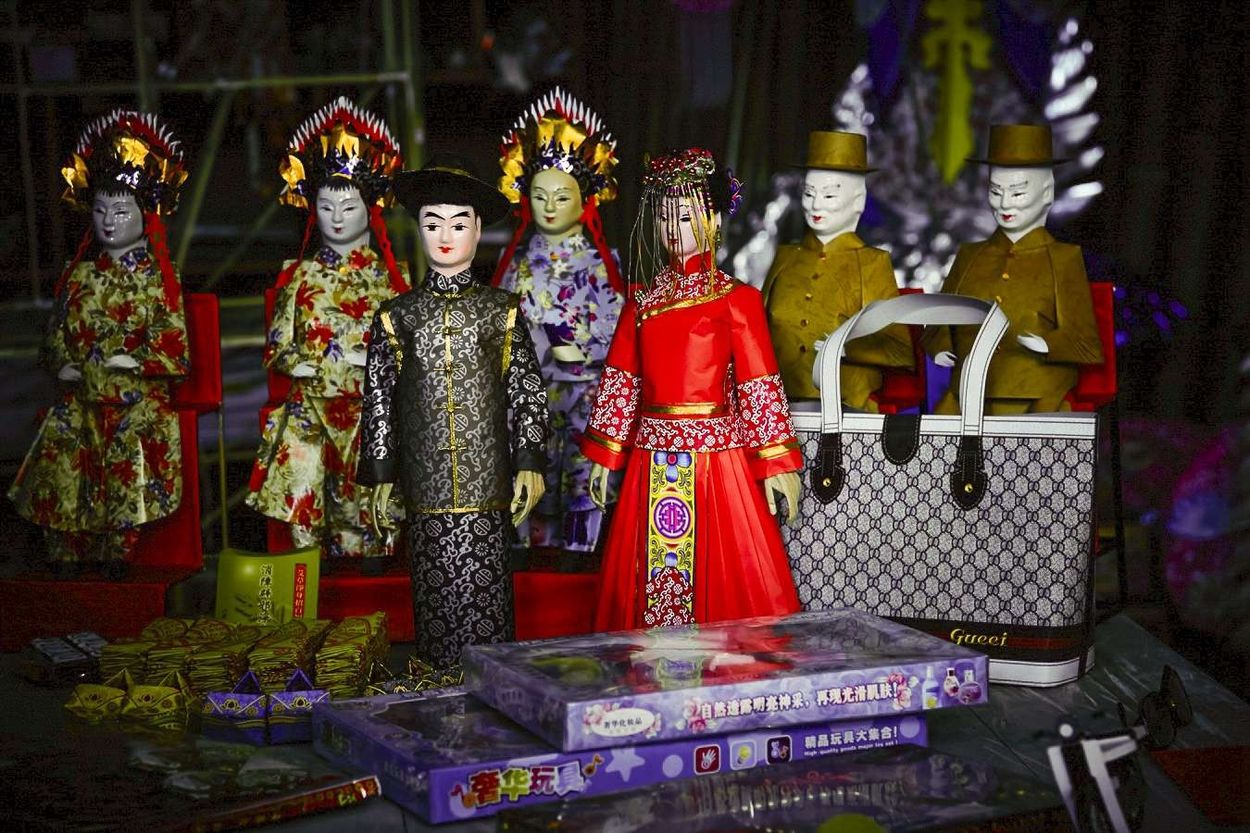
Ghost marriage might sound like a spooky tale, but it's a real practice in some cultures. Ever wondered why someone would marry a spirit? Ghost marriage is a tradition where a living person marries a deceased individual. This custom is found in places like China and Sudan. It's often done to honor the dead or ensure they have a partner in the afterlife. Families believe it brings peace to the departed and harmony to the living. Curious about how these ceremonies work or why they started? Let's dive into 35 intriguing facts about this unique tradition.
Key Takeaways:
- Ghost marriage is an ancient practice where deceased individuals are married off to appease spirits or fulfill social obligations. It involves unique rituals and has legal and ethical implications in modern times.
- Ghost marriages have cultural, religious, and psychological significance, impacting gender roles and community dynamics. They have also made their way into popular culture through literature, films, and art.
What is Ghost Marriage?
Ghost marriage, also known as spirit marriage, is a fascinating and eerie practice where one or both parties are deceased. This tradition has roots in various cultures and serves different purposes, from honoring the dead to fulfilling social obligations.
-
Ancient Tradition: Ghost marriage dates back to ancient China, where it was believed that a deceased person needed a spouse in the afterlife.
-
Cultural Roots: The practice is most commonly associated with Chinese and Sudanese cultures, though it appears in other societies as well.
-
Purpose: In some cultures, ghost marriages are arranged to appease restless spirits and ensure they do not haunt the living.
-
Social Obligation: Families sometimes arrange ghost marriages to maintain social status or fulfill promises made before death.
How Ghost Marriages are Conducted
The process of arranging a ghost marriage can be intricate and involves several unique rituals and customs.
-
Matchmaking: Families often consult a matchmaker or spiritual medium to find a suitable spouse for the deceased.
-
Dowry: Just like in traditional marriages, dowries are exchanged, but they often include symbolic items like paper money and miniature furniture.
-
Ceremony: The marriage ceremony can be elaborate, involving rituals such as burning incense, offering food, and performing traditional dances.
-
Paper Effigies: Paper effigies of the bride and groom are sometimes created and burned to symbolize the union in the afterlife.
Legal and Ethical Considerations
Ghost marriages raise several legal and ethical questions, especially in modern times.
-
Legal Status: In some countries, ghost marriages are recognized by law, while in others, they are considered illegal or are in a legal gray area.
-
Consent: Ethical concerns arise regarding the consent of the deceased, as they cannot voice their approval or disapproval.
-
Inheritance: Ghost marriages can complicate inheritance issues, as the deceased spouse may have claims to property and wealth.
-
Human Rights: Critics argue that ghost marriages can violate human rights, particularly when living individuals are forced into these unions.
Ghost Marriage in Popular Culture
Ghost marriage has also found its way into literature, films, and other forms of popular culture.
-
Literature: Ghost marriages are featured in various novels and folklore, often highlighting the eerie and mystical aspects of the practice.
-
Films: Movies like "Corpse Bride" and "Ghost" explore themes related to ghost marriages, bringing the concept to a broader audience.
-
Television: TV shows sometimes depict ghost marriages in episodes focused on supernatural or cultural themes.
-
Art: Artists have used ghost marriage as a subject to explore themes of love, death, and the afterlife.
Modern-Day Ghost Marriages
Despite being an ancient practice, ghost marriages still occur today, though they have evolved over time.
-
Urban Legends: Modern ghost marriages are often surrounded by urban legends and ghost stories, adding to their mystique.
-
Technology: Some families use technology, like online matchmaking services, to arrange ghost marriages.
-
Globalization: The practice has spread beyond its traditional roots, with ghost marriages occurring in various parts of the world.
-
Controversy: Modern ghost marriages are often controversial, with debates about their relevance and ethical implications.
Famous Ghost Marriages
Several well-known ghost marriages have captured public attention, either due to their participants or the circumstances surrounding them.
-
Historical Figures: Some ghost marriages involve historical figures, adding a layer of intrigue and historical significance.
-
Celebrity Cases: Occasionally, celebrities or their families have been involved in ghost marriages, drawing media attention.
-
Publicized Events: High-profile ghost marriages are sometimes publicized, either to honor the deceased or to bring attention to the practice.
-
Documentaries: Documentaries have been made about ghost marriages, exploring their cultural significance and the stories behind them.
Ghost Marriage and Religion
Religion plays a significant role in the practice and acceptance of ghost marriages.
-
Ancestral Worship: In many cultures, ghost marriages are tied to ancestral worship, where honoring the dead is a key religious practice.
-
Spiritual Beliefs: Some religions believe that spirits need companionship in the afterlife, making ghost marriages a spiritual necessity.
-
Rituals: Religious rituals often accompany ghost marriages, including prayers, offerings, and other ceremonial acts.
-
Taboos: Certain religions have taboos against ghost marriages, considering them unnatural or disrespectful to the dead.
Psychological and Social Impact
Ghost marriages can have profound psychological and social effects on the families involved.
-
Grief: Arranging a ghost marriage can be a way for families to cope with grief and find closure after a loved one's death.
-
Community: These marriages can strengthen community bonds, as they often involve collective participation and support.
-
Stigma: In some societies, ghost marriages carry a stigma, leading to social isolation or discrimination for the families involved.
-
Mental Health: The psychological impact of ghost marriages can be complex, affecting mental health in various ways.
Ghost Marriage and Gender
Gender roles and expectations play a crucial part in the practice of ghost marriages.
-
Patriarchy: In patriarchal societies, ghost marriages often reflect traditional gender roles, with women being more likely to be married off posthumously.
-
Equality: Some modern ghost marriages challenge traditional gender roles, promoting more equal partnerships in the afterlife.
-
Feminism: Feminist perspectives on ghost marriages vary, with some viewing them as oppressive and others as a way to honor women's roles in society.
Ghost Marriage: A Fascinating Tradition
Ghost marriage, a practice steeped in history and mystery, continues to intrigue many. This unique tradition, found in various cultures, highlights the deep connections people maintain with their ancestors. It’s not just about honoring the dead but also ensuring harmony and balance within families.
From ancient China to modern-day Africa, ghost marriages serve different purposes, whether it’s to provide a spouse for a deceased person or to strengthen family ties. These ceremonies often involve elaborate rituals, symbolizing the union of two souls beyond the physical realm.
Understanding ghost marriage offers a glimpse into how different societies view life, death, and the afterlife. It’s a testament to the lengths people will go to respect their loved ones and uphold cultural values. This tradition, though unusual to some, remains a vital part of the cultural fabric for many communities worldwide.
Frequently Asked Questions
Was this page helpful?
Our commitment to delivering trustworthy and engaging content is at the heart of what we do. Each fact on our site is contributed by real users like you, bringing a wealth of diverse insights and information. To ensure the highest standards of accuracy and reliability, our dedicated editors meticulously review each submission. This process guarantees that the facts we share are not only fascinating but also credible. Trust in our commitment to quality and authenticity as you explore and learn with us.


